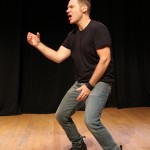“In a good way, Vernon channels his inner Sibyl to schizophrenically present a cast of at least 8 or 9 characters, including a baby cow (seriously), and he does this with such clarity that you’ll only rarely find yourself confused as to who is speaking.
With a single motion, nervous tick, posture, sound or look, Vernon assures that you will immediately know if you are looking at desperate husband Charlie or exhausted wife Julie.
The story itself comes at you like an emotional jackhammer as each of the characters struggles to find or stand up for his or her individuality. And it is this sameness of their pursuits that provides the delicious irony of the piece, proving that what truly draws us to each other is our common need to be unique.

By the end of the hour, you will find yourself as exhausted as the playwright and actor, but it will be a welcome and refreshing exhaustion that will leave you changed—and no doubt heading to the nearest bookstore to find the book.” -(createdbyrcw.com)
“In 2006, author/performer and Arkansas native Thom Vernon left the U.S. for Canada so he could remain with his Zimbabwean partner. However, I can’t detect bitterness towards his native land in his work. His adaptation of his 2010 novel The Drifts surely is worthy of attention for its portrayal of unfulfilled dreams in Arkansas. The inclusion of queer voices makes this story even more compelling. I’m reading the e-book available from Coach House Books right now.” -(Nytheatre.com)
“It’s the pulp you want from Southern Gothic, without the constant page turning.” (the Villager)
“Vernon prowling a bare stage, shifting back and forth between characters while infusing each of them with all the introspection, intensity and menace you’d expect from a good Southern Gothic page-turner.
” -(edgenewyork.com)
“Vernon effectively builds the world around him, and the production’s greatest triumph is the establishment of place and mood. As his characters walk through the snow, you may find yourself getting the chills. Vernon’s physical work — walking through snow, castrating oneself,fighting a calf, putting on a wig — is impeccable and captivating.” -(theatreiseasy.com)
“In 2006, author/performer and Arkansas native Thom Vernon left the U.S. for Canada so he could remain with his Zimbabwean partner. However, I can’t detect bitterness towards his native land in his work. His adaptation of his 2010 novel The Drifts surely is worthy of attention for its portrayal of unfulfilled dreams in Arkansas. The inclusion of queer voices makes this story even more compelling. I’m reading the e-book available from Coach House Books right now.
Thom Vernon’s solo performance switches between four voices. The first is Julie, whose children have grown up and escaped to Hollywood. She is certain that she will get her husband Charlie’s interest again, only she hadn’t planned on having another child at age 46. Charlie has been distracted lately, first by his best friend, Wilson. That liaison is ending, but it seems something is always taking Charlie away from Julie. The cover of the novel has a picture of a poutingly cute calf, so let your imagination go in that direction. A cold, snowy winter surrounds the town.
 Wilson is a strong, self-assured, woman who Julie regards as fleshy and feminine and everyone else in the community thinks of as acting like a man. She works in the Singer sewing machine factory, has her own small herd of cattle, and is the least sad of the characters. She cares for Dol, a male-to-female transgender person who can’t afford the final procedures to transition fully to her new gender. Dol loses his first wife and children when they discover he is working as a cross-dressing performer. As Dol puts it, “She took up Jesus, you took up Mencken.” Dol quite poignantly conveys universal feelings of someone who has already started to move on but is stuck. Dol is looking into less conventional ways to achieve her transition.
Wilson is a strong, self-assured, woman who Julie regards as fleshy and feminine and everyone else in the community thinks of as acting like a man. She works in the Singer sewing machine factory, has her own small herd of cattle, and is the least sad of the characters. She cares for Dol, a male-to-female transgender person who can’t afford the final procedures to transition fully to her new gender. Dol loses his first wife and children when they discover he is working as a cross-dressing performer. As Dol puts it, “She took up Jesus, you took up Mencken.” Dol quite poignantly conveys universal feelings of someone who has already started to move on but is stuck. Dol is looking into less conventional ways to achieve her transition.
The Southern character of this piece is quite compelling. They have plenty of time to be honest. Charlie opines, whether or not it is the “right” trend of thought, that someone should stand up for the baby he wants to have (which his wife does not) and blames welfare recipients for never learning how to take care of their children. I liked the way the characters express themselves. All of them had such unique viewpoints and styles…” -Nytheatre.com Review by Ed Malin · August 10, 2013

